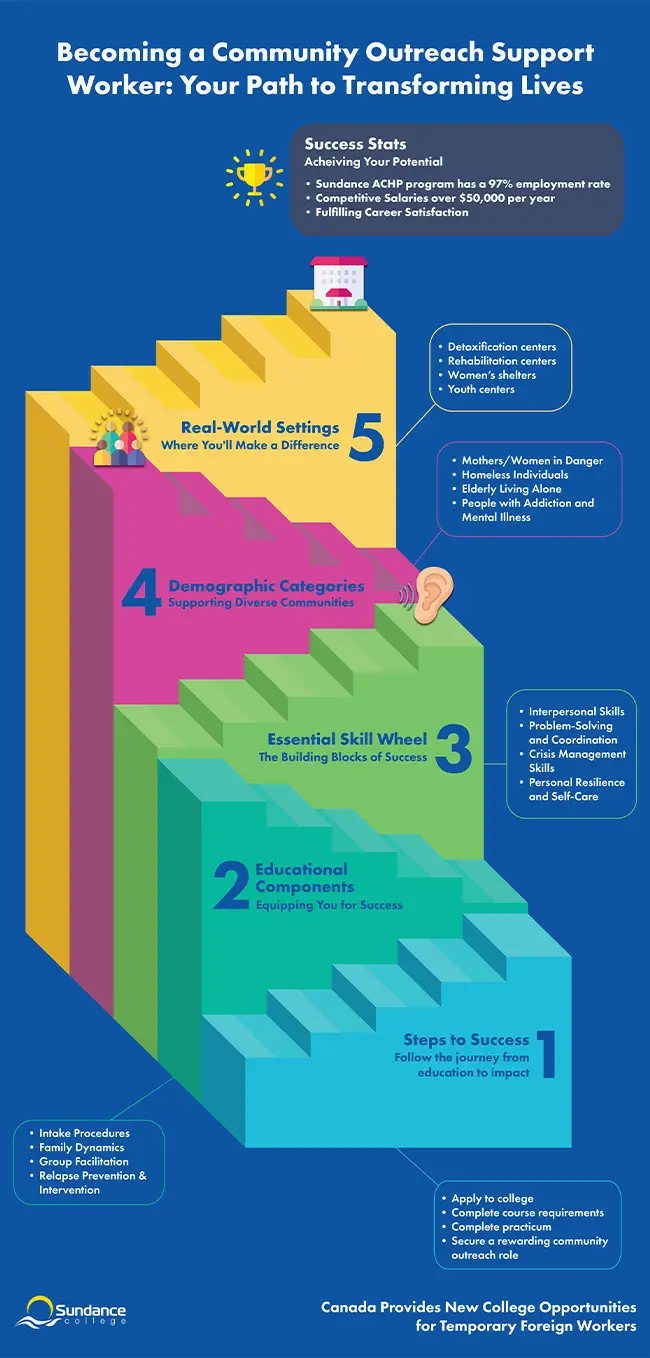Blog / Transforming Lives: Exploring the Path to Becoming a Community Support Outreach Worker
Transforming Lives: Exploring the Path to Becoming a Community Support Outreach Worker

Addictions and Community Health Professional Diploma
- Addictions Worker
- Youth Support Worker
- Family Support Worker
- Drop-in Centre Worker
Table of Contents
Are you passionate about making a positive impact on your community? Do you have a desire to support individuals facing challenges and help them regain control of their lives? If so, this guide could help you be one step closer to a fulfilling career as a community support outreach worker.
In this article, we’ll outline the duties of a community outreach worker as well as the educational requirements, employment opportunities, and necessary skills and qualities to launch a successful career in community services.
We’ll take a look at our Addictions and Community Health Professional Diploma Program, approved by the Canadian Addictions Counsellors Certification Federation, as a pathway to obtaining the education and experience that will help you launch your career. You’ll find the success story of Ashley H., one of our ACHP graduates, and learn how she received a job offer two days into her practicum.

What is an Outreach Support Worker?
A community outreach worker connects vulnerable people with the appropriate community organization and resources.
They frequently work with specific demographic categories, such as:
- Mothers and women who are at danger
- Families in need of extra assistance
- Children and young people
- Newcomers
- Numbers of homeless people
- Elderly people who live alone
- Individuals with disabilities
- Individuals with addiction and mental illness
- Native Canadian groups
Supporting, assisting, and empowering at-risk individuals is the core goal shared by all community outreach professionals.
What Does a Community Outreach Worker Do?

The organization a community outreach worker works for and the demographic they serve will determine their specific duties. However, this role’s normal duties nearly always include:
- Speaking with and advising persons in need of help
- Taking part in treatment plans and programs’ development
- Assisting in setting and achieving life objectives
- Promoting the growth of life management abilities
- Promoting community involvement and integration
- Monitoring development along with extending assistance
Being in direct contact with the public is a given in this line of work. Communication abilities, empathy, and compassion are prerequisites for success in the community outreach worker role.
What are Community Outreach Worker Skills?
Becoming a proficient community outreach support worker requires a unique blend of skills that enable effective communication, compassionate interaction, and resourceful problem-solving. These essential outreach skills are required for building connections with people in need and facilitating positive change within communities.
Here’s a closer look at some of the key skills you should develop and foster to become a successful community outreach support worker:
Interpersonal Skills
Empathy And Active Listening
Empathy and active listening skills lie at the heart of community outreach work. The ability to understand and share the feelings of others is crucial for establishing trust and building client rapport. Active listening, another vital skill, involves giving full attention to what individuals are saying and responding in a way that shows genuine understanding and concern. As a community outreach professional, you need to enhance this skill development for community support, gathering essential information, identifying needs, and tailoring your approach to each individual’s circumstances.
Effective Communication
Clear and effective communication is paramount in community outreach work. Outreach workers must convey information, instructions, and resources in a way that is easily understood by clients from diverse backgrounds. Whether it’s discussing treatment options, explaining available services, or providing guidance, the skill of effective communication in outreach will help you ensure your clients are well-informed and able to make better decisions.
Cultural Sensitivity
Community outreach support workers engage with individuals from various cultural, ethnic, and socioeconomic backgrounds. Demonstrating cultural sensitivity in outreach involves respecting and understanding the unique values, beliefs, and practices of different communities. By acknowledging cultural differences, you can establish respectful relationships and meet the specific needs of each client.
Problem-Solving And Coordination
Problem-Solving And Community Resource Coordination
One of the core outreach worker’s responsibilities is connecting clients with appropriate resources and services. This requires strong problem-solving skills. You need to assess individual needs and identify the most suitable solutions. Being an outreach support worker means acting as intermediary, linking clients to housing assistance, mental health services, addiction treatment programs, and other support systems within the community.
Team Collaboration
Community outreach support workers often collaborate with various stakeholders, including social workers, healthcare professionals, law enforcement, and community organizations. Effective collaborative teamwork in outreach is essential for providing comprehensive support to clients. By sharing insights, knowledge, and resources with fellow professionals, you as a professional outreach support worker can be sure your clients achieve a holistic community care approach to addressing their needs.
Crisis Management Skills
Crisis Intervention
In many cases, community outreach workers encounter individuals facing urgent crises. Whether it’s a mental health crisis, homelessness, or substance abuse emergency, these professionals need to remain calm and composed while providing immediate support. Crisis intervention skills include de-escalation techniques, ensuring safety, and coordinating emergency services when necessary.
Personal Resilience
Resilience And Self-Care
Working in community outreach can be emotionally demanding due to the challenges at-risk people face. Resilience and self-care are critical skills to prevent burnout and maintain long-term effectiveness. Community outreach support workers need to develop strategies to manage their own well-being, seek support when needed, and set healthy boundaries to ensure they can continue making a positive impact.
How Do I Get Into Community Outreach?

Launching a career as a community outreach support worker requires a comprehensive foundation in human services and community support. More often than not, this profession calls for a diploma in fields like human services, community services, or a related discipline.
As you dive into this fulfilling community support career path, you’ll find that you need to be well-versed in a range of disciplines that contribute to your effectiveness in the field. These include:
- Addictions Fundamentals: Understanding the complexities of addiction is essential for providing appropriate support and resources.
- Psychology of Addiction: Exploring the psychological aspects of addiction helps in client interaction and treatment planning.
- Intake Procedures & Treatment Planning: Learning how to assess client needs and develop tailored treatment plans.
- Interviewing & Counselling: Mastering communication skills for effective client engagement and support.
- Group Facilitation: Learning to facilitate group sessions to address shared challenges and promote recovery-focused strategies.
- Relapse Prevention & Intervention: Acquiring strategies to prevent relapse and address setbacks effectively, including trauma-informed care training.
- Health Prevention & Promotion: Understanding how to promote overall health and well-being within the community.
- Ethics: Learning about ethical considerations and professional conduct in community outreach.
- Addictions Awareness Today: Staying updated on current trends and developments in addiction awareness.
Equally important as theoretical knowledge is practical experience opportunities in real-world settings like:
- Halfway houses
- Detoxification centers
- Residential care facilities
- Rehabilitation centers
- Outpatient clinics
- Women’s shelters
- Youth centers
Navigating all these requirements can be simplified by relying on trustworthy options that seamlessly integrate everything. One such option is enrolling in Sundance College’s Addictions and Community Health Professional Diploma Program where you can be equipped with theoretical knowledge and practical skills to successfully enter the workforce.
From Mom to Community Outreach Support Professional: Ashley H.’s Journey at Sundance College

Meet Ashley H., one of the Sundance College graduates from the Addictions and Community Health program. Her decision to enroll in the program was deeply rooted in her personal experiences. She lost her brother at a young age due to addiction and wanted to give back and honor his memory by assisting others facing similar struggles.
Before starting her educational journey at Sundance College, Ashley worked as a heavy equipment operator. Recognizing the need for a career shift that aligned with her values and goals, she looked into various colleges:
“I did my research on different colleges. Of course, you want to hear feedback from students that have gone to the college before, and Sundance had the best reputation.”
By wisely balancing her full-time work, full-time parenthood, and studies, Ashley thrived throughout the program. Upon completing her course requirements, Sundance Career Services set her up in a practicum, where she gained hands-on experience in a harm reduction unit. Just two days into her practicum, Ashley was offered a position with that organization!
With her dedication and proficiency in the field, Ashley secured a full-time position with another organization in the city after graduation and began her work as a community outreach support worker.
Ashley’s inspiring outreach worker journey exemplifies how a well-rounded education, combined with determination and passion, can lead to professional success and personal fulfillment. It also demonstrates the demand for qualified, compassionate professionals. Great job, Ashley!
Take the First Step, Make a Difference with Sundance College
Has Ashley’s story inspired you? Are you ready to embark on your own journey that will not only shape your career but also transform lives within your community? By enrolling in Sundance College’s Addictions and Community Health Professional program, you’ll gain all the knowledge, skills, and hands-on experience outlined above that is needed to excel as a community support outreach worker.
Numbers support this: Sundance College’s ACHP Diploma program has a 97% employment rate. After graduation, our alumni can earn around $50,000 per year working as community outreach coordinators.
As Ashley H. aptly puts it, “I wouldn’t trade my experience at Sundance College for anything. My teachers were amazing. They were able to help even in the difficult times of being online. And I met so many amazing people that I’ll keep those friendships for life.”
If you’re ready to be a catalyst for positive change, take the first step by connecting with one of our advisors to discuss your career aspirations and goals. We are here to support you every step of your educational journey at Sundance College.
Related Blogs
Subscribe for more career advice
Blog Categories
Share on:
